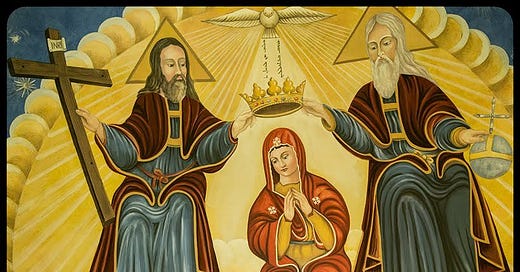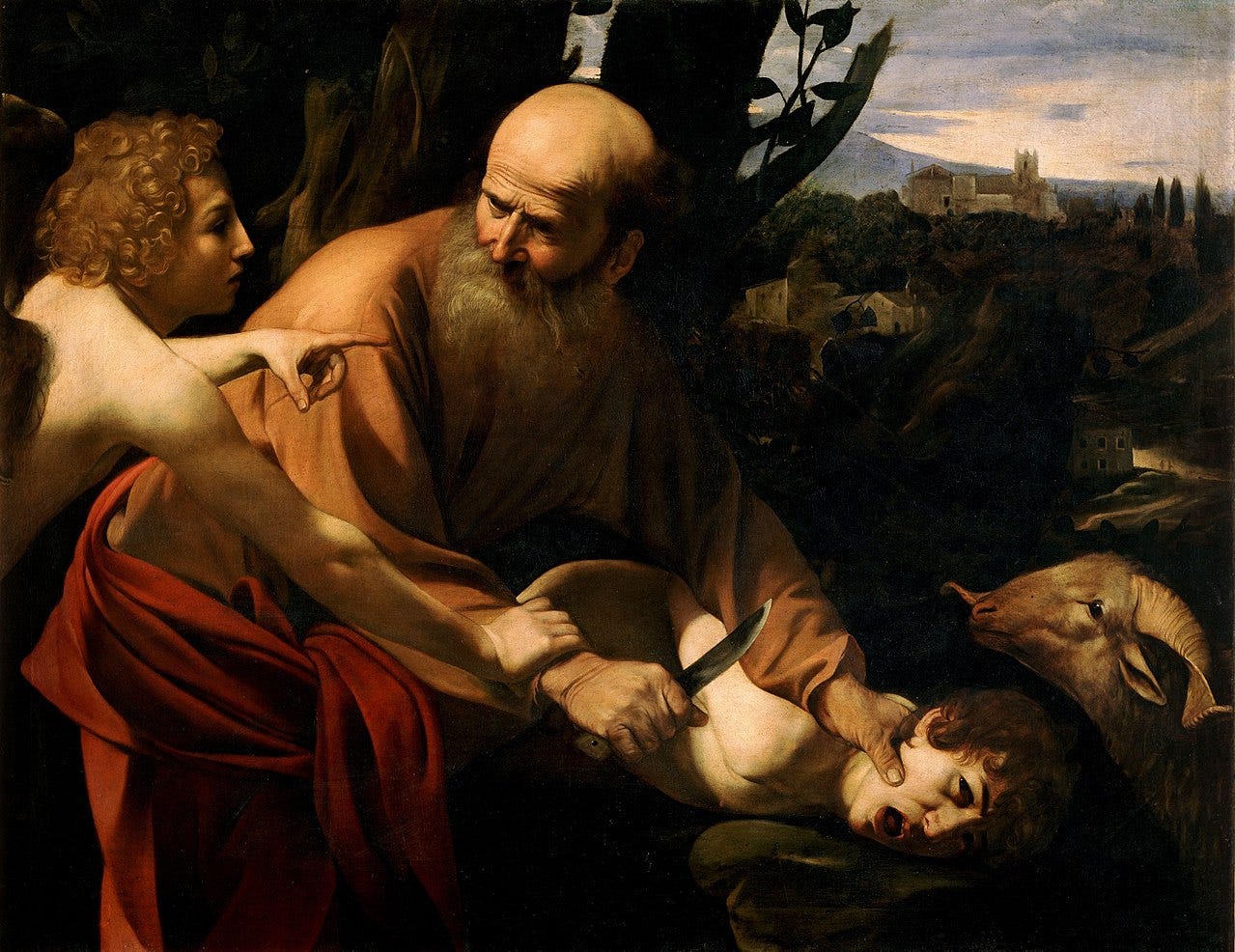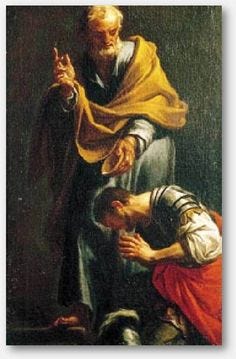While Mary is the New Eve, as the bride of the Sovereign God, she is also destined to be the Queen of Heaven. The importance of a royal marriage is so great and has so many implications for the kingdom that it is not merely a romance but an act of state. These unions are not casually entered into. In the case of the Virgin Mary, God sends an emissary, the Archangel Gabriel, to inquire of the interest and suitability of the potential bride. Once her assent is assured, only then does the Holy Spirit come himself.
A shadchan is a Hebrew term for a matchmaker. Jewish brides were not necessarily part of arranged marriages, but a matchmaker did identify and facilitate the match. A famous instance of matchmaking in Scripture is the trusted servant Eliezer sent by Abraham to find a bride for his son Isaac. This bride turned out to be Rebekah (Genesis 24). An “angel of the Lord” prepares the way and leads Eliezer.
The Lord, the God of heaven and the God of the earth, who took me from my father’s house and from the land where I was born, and who spoke to me and swore to me, saying, ‘To you and your seed I give this land,’ He will send His Angel before you, and you shall take a wife for my son from there (Genesis 24:7).
Jesus is the “new Isaac”—the first-born Son who is to be sacrificed by the Father. However, Mary can also be seen as a type of Sarah, Rebecca, and Rachel, since they were all great matriarchs who conceived children by God’s direct intervention.1 Why do these great matriarchs need this extra help? One reason might be to underscore how truly miraculous all new human life is. Each child is willed and made by God. Each child has his place. There are no anonymous children to God. Each is an indispensable part of God’s plan. However, in the cases of these matriarchs, it also underscores the unique destinies of their children which are so significant that even the circumstances of their births require God’s special attention. Nothing in the universe is an accident. Everything is either directly willed or allowed by God. He dramatically intervenes in the lives of each of these women to show that he and he alone is responsible for our salvation which cannot be accomplished on our own or just through the natural course of events.
It is Rachel and Mary who are the wives of the “true Israel.” Rachel is the wife of Jacob, who was renamed Israel, and Mary is the spouse of God, who leads the “true Israel” of the new Covenant himself. Rachel, like Mary, is also seen as a woman of great sorrow and a great intercessor on behalf of Israel and the Jewish people, or, more properly, the “Chosen People,” both of the Old and New Covenants.
Now the birth of Jesus Christ was as follows: After His mother Mary was betrothed to Joseph, before they came together, she was found with child of the Holy Spirit. Then Joseph her husband, being a just man, and not wanting to make her a public example, was minded to put her away secretly. But while he thought about these things, behold, an angel of the Lord appeared to him in a dream, saying, “Joseph, son of David, do not be afraid to take to you Mary your wife, for that which is conceived in her is of the Holy Spirit. And she will bring forth a Son, and you shall call his name Jesus, for He will save His people from their sins2 (Matthew 1:19-21).
Matthew continues,
“Then Joseph, being aroused from sleep, did as the angel of the Lord commanded him and took to him his wife and did not know her until3 she had brought forth her firstborn Son” (Matthew 1: 24-5).
Unlike the Annunciation, where Luke clearly states that the angel Gabriel appeared to Mary, Matthew mentions twice that it was the “angel of the Lord” who commanded Joseph to take Mary as his wife. The “angel of the Lord” is a reference to Yahweh himself, the Second person of the Trinity, who is manifested and incarnated as Jesus. It is Jesus organizing his own conception and birth in order to fulfill the promise that he made to Adam in the Garden so long ago. He is also fulfilling the promise made to Abraham to substitute himself for Isaac as the sacrificial son.
Then Abraham stretched out his hand and took the knife to slay his son. But the Angel of the Lord called to him from heaven and said, “Abraham! Abraham!” So he said, “Here I am.” He then replied, “Do not lay your hand on the lad, or do anything to him, for now I know you fear God, since for My sake you have not spared your beloved son.” Then Abraham lifted his eyes and looked, and there behind him a ram was caught in a thicket by its horns. So he brought it for a whole burnt offering in the place of his son (Genesis 22:10-13).
The angel of the Lord says for “My sake you have not spared your son.” The offering is clearly being made to Yahweh, not to a created angel which would be an egregious blasphemy.
He chose and created his human mother and he chooses, creates, and leads his adoptive human father. After all, it is Yahweh himself who manages every detail of the movement of the chosen people across the desert to the Promised Land (directly and through his prophet Moses). Why would he suddenly delegate to someone else the movement of the new chosen people to the Promised Land of heaven?
After the Magi visit the baby Jesus, we read,
Now when they had departed, behold an angel of the Lord appeared to Joseph in a dream saying, “Arise, take the Child and His mother, flee to Egypt and stay there until I bring you word; for Herod will seek the young Child to destroy Him” (Matthew 2:13).
Yahweh intervenes to protect his incarnated self and the Holy Family. An objection is raised concerning how Jesus could be the baby and also appear to Joseph in a dream simultaneously.4 Theophanies occur throughout the Bible. Yahweh, who is an uncreated being outside of created space and time, is certainly not limited in how or when or to whom he appears. As he promises, Yahweh again comes to Joseph in a dream in Egypt as the “angel of the Lord.”
“Now when Herod was dead, behold, an angel of the Lord appeared in a dream to Joseph in Egypt, saying, ‘Arise, take the young Child and His mother, and go to the land of Israel’” (Matthew 2:19).
Joseph does as he has been told and then has a fourth dream. The euphemism of “an angel of the Lord” is dropped when Matthew explicitly reveals that Joseph was warned by “God” or “divinely instructed” in the final dream. If the “angel of the Lord” is an actual angel who has been communicating with Joseph, then why does God suddenly dismiss him and take on the task himself?
“And when he heard that Archelaus was reigning over Judea instead of his father Herod, he was afraid to go there. And being divinely instructed (emphasis mine) in a dream, he turned aside into the region of Galilee” (Matthew 2:22).
The Greek word used here for “divinely instructed” and translated as “warned by God” in most English translations, such as the KJV, or as the vague phrase “instructed in a dream” in certain Catholic translations, is not Theos or another expected similar word. Instead, the word is χρηματιζω or chrematizo. The word explicitly and clearly means to be divinely instructed as by an oracle; it implies an official pronouncement. The word “God” is not even mentioned in the original Greek text. Rather, Joseph receives a divine instruction—the final instruction in this series of dreams. The Word himself speaks to him.
Chrematizo is also used in several other places in Scripture. The centurion Cornelius is “divinely instructed” by a “holy angel” to send for Peter “to hear words” from him before becoming the first gentile convert to Christianity (Acts 10:22). The three magi are “divinely instructed” in a dream that they should avoid Herod and return to their own country by another way (Matthew 2:12). Paul describes how Moses was also “divinely instructed” on how to make the tabernacle (Hebrews 8:5). Of course, we know explicitly from the Torah that it was Yahweh who was instructing Moses. The angelic doctors describe heaven as a hierarchy of angels all sharing the same essential task — acting as messengers of God conveying either his wisdom or his power to his Creation. It is possible that these generic sounding references to an “angel of the Lord” refer to an anonymous angel acting as a functionary who simply conveys the messages of “the Lord.” In very few cases in Scripture are angels named; Gabriel, Michael, and Rafael are the only ones. Yet, there are many places where the connections between Yahweh and “the angel of the Lord” are explicit.
Then the Angel of the Lord appeared to him in a flame of fire from the midst of a bush. So he saw the bush burning with fire, but the bush was not consumed. So Moses said, “I will now turn aside and see this great sight, why the bush is not consumed.” When therefore the Lord saw him turn aside to look, God called to him from the midst of the bush and said, “Moses! Moses!” (Exodus 3: 2-4).
A few verses later, the “angel” in the burning bush removes all doubt to his identity and identifies himself as Yahweh,
Then God said to Moses, “I AM WHO AM” (Exodus 3:14)
In Exodus 23:19, the Father and the Son, referred to as the “Lord your God” or (Elohim and Yahweh in the Hebrew), specifically tell the Hebrews they will be sending the Angel to lead them through the desert to the promised land.
“Behold, I send my Angel before your face, to keep you in the way and to bring you into the land I prepared for you. Listen to him and obey his voice; do not provoke him, for He will not pardon your transgressions; for my name is in Him” (Exodus 23: 20-21).
Scripture is clear that it is Yahweh himself who does these things. Of course the phrase “listen to him” also immediately brings to mind the voice of the Father at the Transfiguration, telling the apostles present,
“This is my Son, with whom I am well pleased. Listen to him” (Matthew 17:5).
More than just leading the Hebrews, this “angel” has the power to forgive or not forgive sins or “transgressions,” which is strictly a prerogative of God himself. We see Yahweh as Christ do exactly this, to the horror of the scribes thousands of years later.
And when they could not come near Him because of the crowd, they uncovered the roof where He was. So when they had broken through, they let down the bed on which the paralytic was lying. When Jesus saw their faith, He said to the paralytic, “Son your sins are forgiven you.” And some of the scribes were sitting there and reasoning in their hearts, “Why does this Man speak blasphemies like this? Who can forgive sins but God alone?” (Mark 2:4-6).
A less well known reference that suggests a theophany of Christ is the appearance of the “angel of the Lord” to Gideon in the book of Judges.
“Now the Angel of the Lord came and sat under the terebinth tree in Ephrathah which belonged to Joash, the father of Esdri, while his son Gideon threshed wheat in the winepress” (Judges 6:11).
The angel sits under a tree, which is a type of the Cross, while a “son” threshes wheat in a winepress, which of course suggests the bread and wine of the Eucharist. The judges in the book of Judges are redeemers who are repeatedly appointed by God to save Israel from the results of its depravity and faithlessness. Gideon is one such savior. Gideon brings an offering of bread and meat in a basket to the angel. Of course, no one should worship angels or any other created being, only God.
“The Angel of the Lord stretched out the end of the staff that was in his hand and touched the meat and the unleavened bread; and fire rose out of the rock…” (Judges 6:20)
The angel seems quite tangible as he has hands, carries things, and interacts with the physical world. Gideon knows something more is going on and understands this is not just an angel, an amazing thing in itself, but that he is actually witnessing a theophany.
Now Gideon perceived this was the Angel of the Lord. So Gideon said, “O Lord, my Lord!” For I have seen the Angel of the Lord face to face.” Then the Lord said to him, “Peace be with you; do not fear, you shall not die.” So Gideon built an altar there to the Lord and called it the Peace of the Lord (Judges 6:22-24).
“Lord” is Kyrios, which is Greek for “Yahweh.” Therefore, Gideon calls the angel “Yahweh,” indicating that he knows exactly whom he is talking to. Of course Gideon also knows that only Moses could see Yahweh face to face during the Exodus without being struck dead and is afraid. As Peter points out when he is talking to the resurrected Yahweh on the shores of the Sea of Galilee in John 21, Christ knows everything, including what we are thinking. Yahweh knows Gideon’s fear and reassures him by saying, “Peace be with you,” which is exactly what the risen Christ says to the apostles in the Upper Room when he appears to them after the Resurrection and they too are in mortal fear (Luke 24:36).
Perhaps the most famous appearance of “the angel of the Lord” is when Yahweh announces his own birth to the shepherds and the world.
And behold an angel of the Lord stood before them, and the glory of the Lord shone around them, “Do not be afraid, for behold, I bring you good tidings of great joy which will be to all people. For there is born to you this day in the city of David a Savior who is Christ the Lord. And this will be the sign to you: You will find a Babe wrapped in swaddling cloths, lying in a manger.” And suddenly there was with the angel a multitude of the heavenly host praising God and saying: “Glory to God in the highest, and on earth peace, goodwill toward men!” (Luke 2:9-14).
Whether “an angel of the Lord” refers always and only to Yahweh or sometimes simply to a messenger angel, any communication, any word of God’s, must come through the second person of the Trinity—the Word. Whether Yahweh/Jesus is acting directly or through a messenger, the actions of these “angels of the Lord” must be directed by God. The angels do not take it upon themselves to intervene in and direct human history based upon their own wills and wisdom. Only fallen angels do so, and their counterfeit “wisdom” always leads to destruction and the chaos of hell. God does not cease to be God. The internal workings of the Trinity are not suspended during the Word’s incarnation and sojourn on Earth as a mortal man. That is impossible. Yahweh personally takes responsibility to direct the events of salvation history from inside and outside of time.
After all, the Passion itself cannot be delegated to any created being, nor does God take chances with the events leading up to it. Theophanies of the “angel of the Lord” are uncommon but not rare in Scripture, even though God is always there actively directing events. After the Last Supper and the institution of the New Covenant priesthood, the rare theophanies of the Old Covenant are replaced by the overwhelming irruption of theophanies of the in persona Christi priesthood ceaselessly becoming Christ himself each time a sacrament is administered in his name somewhere in the world. He baptizes every baby, hears every confession, visits every sickbed, confirms every believer, blesses every marriage, ordains every priest, casts out every demon, and confects every Eucharist. In the Supplices te Regamus at the traditional Latin mass, he explicitly takes the sacrificial offering of himself to the Father on our behalf.
We most humbly beseech Thee, almighty God, command these offerings to be borne by the hands of Thy holy Angel5 to Thine altar on high, in the sight of Thy divine majesty, that as many as shall partake of the most holy Body and Blood of Thy Son at this altar, may be filled with every heavenly grace and blessing. Through the same Christ our Lord. Amen.6
Some things you just have to do yourself.
Sarah was 90 years old when she bore Isaac (Genesis 21:1-8). Rebecca could not conceive until God intervened and she bore Jacob and Esau (Genesis 25:21-28). Rachel is infertile until God “opens her womb” and she bears Joseph (Genesis 30:22-23).
The angel of the Lord is alluding here to Isaiah’s famous prophecy:
Therefore the Lord Himself will give you a sign: behold, the virgin shall conceive and bear a Son, and you shall call His name Immanuel (Isaiah 7:14).
The Greek word used for “until” is εως or heos which means until, as far as, etc. Matthew’s point is to emphasize that Jesus is a virgin birth. He isn’t commenting in this passage on what Mary does or doesn’t do after Jesus is born. He must think it so obvious that she remains a virgin that nothing more needs to be said.
We have deliberately addressed issues related to time in previous posts in order to explain various “miracles,” but also to explain the functioning of the Trinity itself and the re-presentation of the sacrifice of the Mass.
An “angel” is simply a messenger. In this context, it is most likely the Son himself or perhaps the Holy Spirit since no created being could possibly mediate the awesome conversation within the Trinity.
Dom Gaspar Lefebvre, St. Andrew Daily Missal, (Great Falls, Montana: St. Bonaventure Publications, 1999) 976-977.










